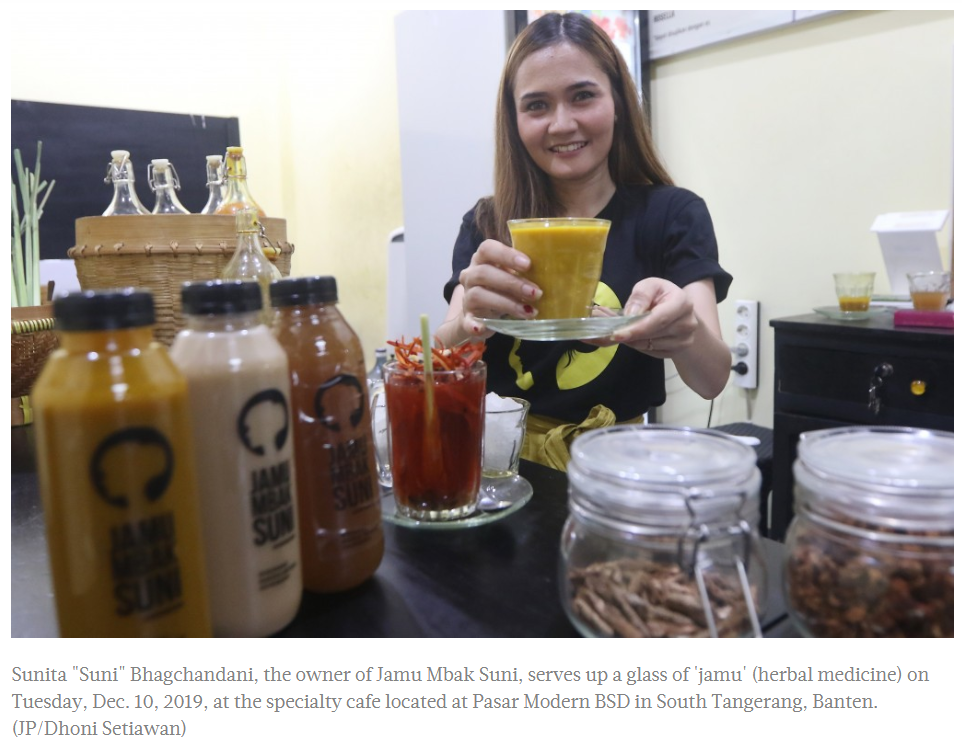Market reports paint a bright, post-pandemic future for Indonesian ‘jamu’
As the COVID-19 pandemic changes the global business landscape, jamu (herbal medicine) producers are playing a growing role in the Indonesian economy.
National jamu sales in 2019 generated Rp 21.5 trillion (US$1.38 billion) in revenue, up 13.1 percent from Rp 19 trillion in 2018, according to the Indonesian Jamu and Traditional Medicine Producers Group (GP-Jamu).
While this year’s figure remains indeterminable due to the outbreak’s impacts on logistics and consumer buying power, the available figures and reports indicate a promising future for the herbal medicine market.
Even amid the economic downturn due to the government’s COVID-19 emergency measures, the first quarter of 2020 saw the jamu and herbal supplements segment contribute more than 68 percent of its Rp 730.72 billion sales revenue, a year-on-year (yoy) increase of 2.4 percent.
Meanwhile, Indonesia’s herbal medicine giant Sido Muncul saw its profit jump 10.85 percent yoy to Rp 231.53 billion in January-March.
“I think demand has increased because people want to stay healthy during the pandemic, and the profit surge is quite large,” Sido Muncul director Irwan Hidayat, whose family owns majority shares in the company, told The Jakarta Post on Monday.
Irwan also estimated a 30 percent surge in demand this year, with customers flocking to buy jamu containing plants from the curcuma genus, such as turmeric and ginger. With this promising outlook, he estimated a 10 percent increase in both sales and profit by the end of the year.
His statement is reflected in the findings of How COVID-19 is impacting food and drink markets in Southeast Asia, a recent report from global market research firm Mintel. The study has found that many consumers are turning into traditional remedies to boost their immune system amid the pandemic.
According to the report, many Indonesians are stocking up on jamu as well as the herbs and spices used to make jamu, which has caused the prices of herbs like red ginger and temulawak (Javanese ginger) to increase.
Sido Muncul CFO Leonard said that the company was still of the view that its herbal medicines line would remain the main contributor to sales this year, despite its assumption of a decline in overall sales as a result of potential decline in consumer buying power due to the outbreak.
“We will still try to maintain the availability of our health products that can help boost consumers’ immune system to meet demand in the Indonesian market,” he said.
Indonesia has over three-quarters of the more than 40,000 medicinal plants in the world according to the Indonesian Institute of Sciences (LIPI), and is an untapped source of the global market for herbal medicines.
In 2018, the country had 1,247 jamu producers, of which 129 were large manufacturers using modern technology. The remaining 1,118 producers were micro, small and medium enterprises (SMEs), the majority of which used traditional jamu production methods.
The segment employed up to 15 million workers, comprising 3 million workers in the jamu and traditional medicine segment, and the remaining 12 million workers employed in related sectors and markets that used jamu products, such as the food and beverage and cosmetics industries, as well as the spa services and aromatherapy markets.
Market observer Charles Saerang said that jamu producing SMEs were benefiting the most during the public health crisis.
“I believe there has been a huge impact on the [jamu] SMEs. Right now, young people who are concerned about their health due to COVID-19 are realizing the benefits of lemongrass, curcuma, turmeric, [and this has] greatly impacted the SMEs,” he said.
Charles added that jamu producing SMEs were ahead in innovating jamu, as they were more flexible in terms of product modification compared to bigger, established companies. He was also confident that the jamu market would continue to develop over the long term.
“Jamu culture can transform and penetrate the pharmaceutical [industry], and through restaurants to become part of the food and beverages industry,” he said.
Jony Yuwono, the 36-year-old owner of Acaraki Jamu in Jakarta, said that the specialty cafe saw a 20 percent surge in sales at the beginning of the outbreak, serving over 100 cups of jamu per day. However, he had to temporarily close both Acaraki cafes in Kemang and Kota Tua to comply with the government’s social distancing policy, so the company was now entirely dependent on takeaways and online orders.
The jamu cafe, which also sells packages of ground turmeric and other herbal ingredients, serves its customers unique products that are blended and brewed using coffee-making equipment like the Hario V60 coffee maker, French presses and AeroPress.
“I think the future of jamu in Indonesia after the pandemic will be even brighter than before, as people have become more aware of their health because of it,” said Jony, who hoped that the jamu consumption trend would emerge as the new normal after the crisis.
Business research and consultancy Inventure Indonesia even dubbed jamu as “the new espresso” in its report on shifts in consumer behavior as an impact of COVID-19, with managing partner Yuswohady predicting that the jamu consumption trend would shift from mere functional food to lifestyle.
–Yunindita Prasidya contributed to this story.
Source: https://www.thejakartapost.com/news/2020/04/29/market-reports-paint-a-bright-post-pandemic-future-for-indonesian-jamu.html


 English
English




